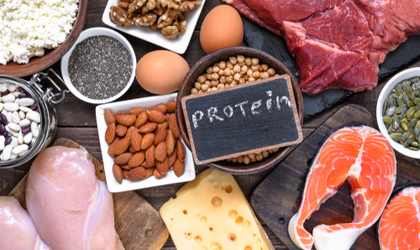
Poor diets and sedentary lifestyles mean many of us have never had such fragile bones. Far from being a ‘disease of the elderly’, a staggering 3 million people are affected by osteoporosis in the UK – a condition that weakens bones and makes breakages more likelyi. In truth, though, it’s never too early to start improving your bone density and building a body for life. And it’s something you can – and absolutely should – be doing. Because waiting for that wake-up call fall isn’t all that fun. The good news is that bolstering your bones is easy. Chances are, you’re ticking many boxes already. Here’s how to bone up on bone health.
What are bones?
Beyond being inert hangers for your swathes of skin, the 206 bones in your body are living structures that perform the impressive job of holding you up and protecting all your organs. For many people, peak bone mass occurs in their late 20s, and will slowly decline around the age of 35. Thanks to the role of hormones and increased life expectancy, women are generally more vulnerable to osteoporosis than their male counterparts. That said, bone health affects everyone; and it’s enormously important to prioritise it at every stage of your life, regardless of gender or age. Know that with the correct tools you can improve it.
How can you improve bone health?
Nutrition
Eating a balanced diet won’t only serve your waistline, energy levels, skin, and mood (the list could go on), but it will also pay off in bone health dividends. Unsurprisingly, a top priority is chowing down on those nutrients we traditionally associate with bone health. And numero uno is calcium (yes, the well-worn cliché that calcium makes bones stronger exists for a reason). Typically found dairy products, dark leafy green veggies, seeds, sardines, beans, lentils, and calcium-fortified products, this mineral is essential for maintaining your bone mass. Vitamin D is another important bone-bolstering nutrient since it supports the absorption of calcium. In addition to cramming more eggs, cheese, and oily fish into your diet, get outside and soak up the sun’s vitamin D-inducing rays.
Besides these fellas, your bones also need the likes of zinc, vitamin C, B vitamins, magnesium, omega-3 fatty acids, vitamin K to stay strong and resilient. Since your bones are comprised of 50% protein, this should also form a cornerstone of your bone-building regimen. Scientists now believe low protein intake may decrease calcium absorption, and thereby affect bone densityii. Up your intake of oily fish, lean meats, and plant-based protein, like tofu, pulses, nuts, and grains. Side note: because balance is so central to bone health, vegans will need to pay particular care to ensure dairy and meat-free substitutes are fortified with the aforementioned nutrients. Alternatively, a comprehensive multivitamin is always an option to plug any nutritional gaps. Delve into the specifics of bone nutrition here.
Weight
On the topic of nutrition, we need to mention weight – in particular, not eating enough. Dropping into a calorie deficit is never a good idea. In addition to making your metabolism sluggish and causing muscle loss, it can be extremely dangerous for your bones. A raft of evidence suggests diets delivering fewer than 1,000 calories each day can lead to compromised bone densityiii. In one study, obese women who ate 925 calories every day for four months lost a significant amount of bone density loss from their upper thigh and hip regionsiv. With this in mind, it’s not surprising that individuals with eating disorders are more likely to experience a heightened risk of weakened bones and osteoporosis. As a rule of thumb: eat a balanced, varied, and colourful diet – one that’s brimming with plenty of protein and the slew of bone-bolstering nutrients we’ve mentioned above. Oh, and make sure it delivers at least 1,500 calories per day, too.
Being overweight won’t do your bones any favours, either. While weight loss is thought to have a more pronounced effect on bone density, carrying extra pounds can also increase the risk of breakages and fractures thanks to the stress of surplus weight on the bodyv. Fluctuating weight also isn’t healthy. One study revealed bone loss during weight loss wasn’t reversed when the pounds were regained, implying repeated cycles of gaining and losing weight could lead to poor bone density over an individual’s lifetimevi. Bottom line: try to maintain a stable weight, where possible – your bones will thank you for it.
Exercise
Exercise is a powerful weapon to strengthen bones. These structures actually need a challenging to keep them strong. Chances are, if you go mindlessly from desk to bus to sofa each day, your bones are probably feeling a little neglected. Jogging, walking, squatting, lunging, and circuit training are brilliant examples of weight-bearing exercises. This form of physical exercise is a useful vehicle for cultivating stronger bones because it stimulates osteoblasts – cells that encourage bone growth. In one study, older women and men who performed weight-bearing exercise saw an increase in bone mineral density, bone size, and bone strengthvii. The secret, however, is to not push it; exercising intensely and excessively isn’t great for joints (as every marathon runner will know!). Aim for three, 30-minutes, sessions every week. Don’t forget strength-bearing exercise will also help build strong bones. Why not grab some weights after you jump off the treadmill?
Flexibility is crucial, too. And while you don’t need to downward dog like a yogi to benefit your bones, you shouldn’t underestimate the advantages of staying limber. Stretching is vital for healthy bones. After all, muscles and bones work in tandem. If your muscles are tight, your bones will know about it. Ideally, if you were to fall, you’d want your muscles – not the bones themselves – to absorb the shock and force. Improving flexibility is as simple as incorporating 5 minutes of stretching into your daily routine. Of course, a weekly yoga class will also work a treat. Learn more about exercising for bone health here.
Lifestyle
You’re probably not surprised to see the likes of excessive alcohol consumption and smoking in this list. Beyond impacting your overall health in a host of negative ways, these vices will conspire to hijack your bone health, too, rendering you more prone to osteoporosis. For starters, chronic alcohol exposure interferes with the balance of calcium in the body, which, as we already know, is essential for building and maintaining strong bones. Worse still, excessive alcohol can skew the production of vitamin D, a nutrient needed for calcium absorption. Be mindful the National Drinking Guidelines stipulate that men and women shouldn’t exceed 14 units of alcohol per week. Make a conscious effort not to exceed this.
Smoking isn’t any better. This unhealthy habit affects your bone-building cells, with countless studies illuminating the toxic relationship between tobacco use and decreased bone densityviii. Stubbing out smoking won’t just benefit your bones; your lungs, heart, and overall wellbeing will also love you for it. Just another reason to quit, right?
Hormones
There’s a reason why women are disproportionately affected by osteoporosis. One word: hormones. As oestrogen levels start to dwindle around the time of the menopause, bones begin to become brittle. In fact, women can lose up to 20% of their bone density in the five to seven years after the menopauseix. And that’s why it’s crucial for women to prepare their bodies for the inevitable – a move that will lessen the blow of this hormonal change in old age. Make eating a varied diet – with a comprehensive spread of the bone bolstering nutrients mentioned above – staying active, getting enough sunlight, and drinking sensibly are mainstays of your bone supporting arsenal before, during, and after the menopause.
Genetics
Finally, it’s worth mentioning that if brittle bones run in your family, then you may be more susceptible to developing them yourself (sorry). Use this as an incentive to take your bone health seriously and be sure to consult your GP should you have any concerns.
References:
-
nhs.uk, (2019). Osteoporosis. Available online: https://www.nhs.uk/conditions/osteoporosis [Accessed 29 Mar. 2019].
-
Kerstetter. J., O'Brien,. K. & Insogna. K. (2003). Low Protein Intake: The Impact on Calcium and Bone Homeostasis in Humans. The Journal of Nutrition, 133(3), 855S-861S.
-
Redman. L. (2008). Calorie Restriction and Bone Health in Young, Overweight Individuals. Archives of Internal Medicine. 168(17), p.1859.
-
Andersen. R., Wadden. T. & Herzog. R. (1997). Changes in bone mineral content in obese dieting women. Metabolism. 46(8), 857-861.
-
Bachmann. K., Currie. A., Bredella. M., Schorr. M., Lawson. E., Gill. C., Singhal. V., Meenaghan. E., Gerweck. A., Eddy. K., Ebrahimi. S., Koman. S., Greenblatt. J., Keane. R., Weigel. T., Dechant. E., Misra. M., Klibanski. A., Bouxsein. M. & Miller. K. (2015). Vertebral Strength and Estimated Fracture Risk Across the BMI Spectrum in Women. Journal of Bone and Mineral Research. 31(2), 281-288.
-
Villalon. K., Gozansky. W., Van Pelt. R., Wolfe. P., Jankowski. C., Schwartz. R. & Kohrt. W. (2011). A Losing Battle: Weight Regain Does Not Restore Weight Loss-Induced Bone Loss in Postmenopausal Women. Obesity. 19(12), 2345-2350.
-
Klentrou. P., Slack. J., Roy. B., Ladouceur. M. (2007). Effects of Exercise Training with Weighted Vests on Bone Turnover and Isokinetic Strength in Postmenopausal Women. Journal of Aging and Physical Activity. 15(3), 287-299.
Marques. E., Mota. J., Viana. J., Tuna. D., Figueiredo. P., Guimarães. J. & Carvalho. J. (2013). Response of bone mineral density, inflammatory cytokines, and biochemical bone markers to a 32-week combined loading exercise programme in older men and women. Archives of Gerontology and Geriatrics. 57(2), 226-233. -
Wong. P.K., Christie. J.J., Wark. J.D. The effects of smoking on bone health. Clin Sci (Lond). (2007). 113(5): 233–241.
Brot. C., Jorgensen. N.R., Sorensen. O.H. The influence of smoking on vitamin D status and calcium metabolism. Eur J Clin Nutr. (1999). 153(12): 920–926.
Ward. K.D., Klesges. R.C. A meta-analysis of the effects of cigarette smoking on bone mineral density.. Calcif Tissue Int. (2001). 68(5): 259–270. -
nhs.uk (2019). Menopause and your bone health. Available online: https://www.nhs.uk/live-well/healthy-body/menopause-and-your-bone-health [Accessed 28 Mar. 2019].
You Might Also Like

Olivia
Olivia Salter has always been an avid health nut. After graduating from the University of Bristol, she began working for a nutritional consultancy where she discovered her passion for all things wellness-related. There, she executed much of the company’s content marketing strategy and found her niche in health writing, publishing articles in Women’s Health, Mind Body Green, Thrive and Psychologies.
View More



